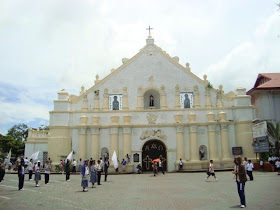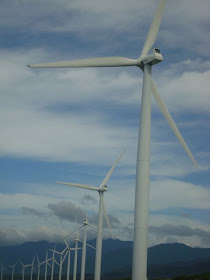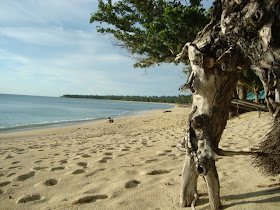When one visits the Ilocos region, the trip to the beach is the capping of a wonderful cultural tour of the region with its many heritage sights. Old churches and vintage houses and other natural wonders are found in almost every town of the Ilocos.
Our trip to Ilocos started with our plane ride to Laoag which was already late in the evening coming from Manila. I was trying to contact a priest who was our host when I brought a group of priests there 14 years before. It so happened he was still in the U.S. Somebody said that a priest originating from Leyte was now working in the diocese and so after we were able to contact him, we ended up being billeted at the Bishop’s residence. We had three full days of going around the region and we wanted to maximize our time by going around to as many places as we could do. Since there were only three of us this time, (I had with me my two assistants who have never been up north yet) hiring a van was beyond our budget. To the rescue came our host in Pagudpud who happens to be from Leyte. She graciously offered her van for our tour and even was our tourist guide on the first day.
 |
| Kapurpurawan Rock Formation in Burgos |
St. William Cathedral of Laoag
|
|
The Bishop's Residence of Laoag
|
|
|
Posing with the Bishop of Laoag, Most Rev. Sergio Utleg, who goes around for his visits to the parishes on his motorbike.
|
 |
With Fr. Danny (r) who helped us to stay at the Bishop's Residence.
|
|
|
A statue of St William? in a niche by the facade of the Cathedral
|
|
|

|
|
Altar of St. William Cathedral of Laoag
|
|
|
The 13th Station of the Cross inside the Cathedral
|
The first day of our tour was around the city of Laoag going south up to Vigan in Ilocos Sur. We visited first the seminary where a canon lawyer friend was residing. Then we passed by the Lourdes Parish just near the seminary. We visited also the nuns of the Clarisas Capuchinas which was just in the area also. This group of nuns happens to belong to the same branch as the nuns found in Ormoc. Then off we went to visit the Fort Ilocandia Hotel which is still well maintained. The Malacanang of the North in Paoay was our next stop followed by the famous world heritage site which is the church of Paoay. Then off we went to Batac to visit the Marcos mausoleum and the church. The last town going south of Ilocos Norte is Badoc where the house of the famous painter Juan Luna is found. They also still have preserved their old parish church which is worth visiting.
|
 |
| Posing with Msgr. Ruben Abaya (2nd from left) and a sister from Jaro, Leyte. |
 |
Poor Clare Nuns Monastery. The original sisters who started this monastery came from Mexico.
 |
| Entrance to the Poor Clare Nuns Monastery |
|
|
|
Inside the Chapel of the Monastery of the Clarisas Capuchinas
All the nuns came out to meet us.
 |
The nuns are happy to be visited.
 |
Lourdes Parish Church just near the Seminary
 |
| Altar of Lourdes Parish |
|
|
|
 |
| Fort Ilocandia Hotel which is frequented by Taiwanese tourists |
 |
| Lobby of the FIL |
 |
| Fort Ilocandia Hotel |
 |
| A covered walk of the sprawling Fort Ilocandia Hotel |
 |
Fort Ilocandia Hotel
|
|
The Malacañang of the North in Paoay
|
|
A painting of the Paoay Church inside the Malacañang of the north
|
|
Inside the Malacanang of the North
|
|
The Paoay lake as seen from the balcony of the Malacanang of the North
 |
| Paoay Lake |
|
|
 |
| The world famous church of Paoay |
 |
| Paoay altar |
 |
| Wall buttress of church of Paoay |
 |
| Side door of the church of Paoay |
 |
| Sign for the Batac Church |
 |
| Church of Batac |
 |
| The Marcos mausoleum in Batac |
 |
At the entrance of the Marcos mausoleum
 |
| Tarpaulins of Imelda and her two children Imee and Bongbong, all winners in the last election were still found all over the province of Ilocos Norte |
|
|
The Baroque Church of Badoc
|
|
 |
Buttressed walls of Badoc Church
 |
Inside Badoc church
 |
| Altar of Badoc Church |
|
|
 |
| The miraculous Virgen of Badoc, proclaimed Patroness of Ilocos Norte in 1980 on account of the several miracles that have been ascribed to her. The statue was found in 1620 at sea together with the Sto. Cristo which was entrusted to the mission church of Sinait which now belongs to Ilocos Sur. |
 |
| The crucifix in Badoc |
|
|
The reconstructed house of the birthplace of Juan Luna in Badoc, Ilocos Norte.
|
 |
| Historical marker for the birthplace of Juan Luna |
|
|
Reproduction of the paintings of Juan Luna adorn the garden of the house of Luna
|
The first town of Ilocos Sur coming down south from Laoag, Ilocos Norte is Sinait. We passed by the church of Sinait to pay homage to its miraculous crucifix. The churches of Cabugao (which maintained its old structure outside but the altar is already new) and Magsingal (with its gold leafed retablo and bell tower) are also worth a visit. The town of Bantay sits just right at the mouth of the city of Vigan. Hence a visit to their old church was in order. Then off to Vigan (Archdiocese of Nueva Segovia) we went to walk around the heritage houses, the Cathedral, the Vigan pottery and the Baluarte (zoo) of the Singsons. It was back to Laoag for the night.
 |
| Sinait Church |
 |
| Sinait Church |
 |
| The Altar of Sinait Church where the miraculous crucifix is enshrined. |
 |
| Side entrance to the church of Sinait |
 |
Frs. Bench and JV posing by the Miraculous images of the Crucified Christ at the main altar. This cross was found together with the Miraculous image of Our Lady in 1620 at sea, now enshrined in the church of Badoc, Ilocos Norte.
 |
A close-up view of the crucified Christ.
 |
| Church of Cabugao |
 |
| Inside the church of Cabugao which has already been renovated. |
 |
| Inside the Veneration Chapel of Cabugao |
 |
| Ruins found at the back of the church of Cabugao |
 |
| Church of Magsingal |
 |
| The altar retablo of Magsingal |
 |
| The new municipal hall of the town of Magsingal |
 |
| The belltower of Magsingal is found across the street from the church |
|
|
The belfry tower of Bantay
 |
Bells of the Bantay belfry still hanging precariously
 |
| View from the Bantay belltower overlooking the cemetery |
|
|
|
The view from the belfry of Bantay
|
|
 |
| Inside the Bantay Church |
 |
| Altar of Bantay |
 |
| The statue of Our Lady could be turned so that one can venerate it at the back of the altar. |
 |
| The Lady and child enshrined at the Church of Bantay |
 |
| Vigan Cathedral (Archdiocese of Nueva Segovia) |
 |
| Altar of the Vigan Cathedral |
 |
| Vigan Cathedral with its belltower |
 |
| Vigan pottery |
 |
| Vigan heritage houses with Mae Ann Santos |
 |
| A row of old houses in Vigan |
 |
| At the Baluarte zoo of the Singsons |
 |
| A white pythoon |
 |
| It looks like a casino that the Singsons are building |
 |
| I counted at least seven tigers in their private zoo |
 |
| A large pythoon that they're holding |
 |
| At the Vigan pottery shop |
The second day were visits to the old churches of Sarrat, Dingras, San Nicolas and the Laoag Cathedral and the sinking belltower of Laoag. The afternoon trip was now going up north starting with a visit to Bacarra and its leaning bell tower, Pasuquin with its salt factories, the light house, Cape Bojeador in Burgos and Kapurpurawan Rock Formation also in Burgos, Bangui wind farm and Pagudpud for its famous beaches.
 |
| Belltower of Sarrat |
 |
| The Santa Monica Church of Sarrat which at 100 meters in length is the biggest church in the Ilocos region. |
 |
| The convent of Sarrat |
 |
| A passage connects the convento to the church |
 |
| Those are logs above that make up the rafters and beams 50 feet in length and there are 480 of them. |
 |
| The pulpit |
 |
View of the church from the choir loft. In this church Marcos who is a native of the place celebrated his 60th birthday in 1977 and his daughter Irene got married in 1983.


|
 |
| They are trying to restore the crumbling old facade of the church of Dingras which may be beyond repair already |
 |
| Buttressed old walls of the church of Dingras |
 |
The altar of the church of Dingras with new roofing in place
 |
| The Historical marker of the church of Dingras |
 |
 |
| Inside the old church which they are trying to restore |
 |
| Remains of the walls which are crumbling in some parts |
 |
| New steel posts and roofing have been installed |
 |
| Heavy signs of deterioration of the facade of the church from inside |
 |
Window of the old church of Dingras
 |
Restored columns of the Church of Dingras
 |
Dingras altar
 |
| Buttressed walls of the church of Dingras |
|
|
 |
The new church of Dingras
 |
| San Nicolas Church |
|
|
 |
| The brick walls of San Nicolas Church |
 |
| Window of the San Nicholas church |
 |
| Inside the church of San Nicolas |
 |
They are also renovating the church.
 |
 |
| Bacarra Municipal building |
 |
| Bacarra Church |
 |
Inside Bacarra church
 |
Bacarra Altar
 |
| The leaning belfry of Bacarra. |
 |
|
Pasuquin Parish Church
 |
| Salt making in Pasuquin |
 |
| Salt water with salt rock crystals being boiled to extract the salt using rice husks as fuel. |
 |
| Salt |
 |
| Salt now being sold along the highway |
 |
| Salt stores by the highway |
 |
| Signpost to the lighthouse |
 |
The lighthouse seen from below
 |
 |
Cape Bojeador lighthouse
 |
 |
Sights down below from on top of the lighthouse
 |
 |
| Souvenir shot of the Cape Bojeador lighthouse |
 |
| Also found in Burgos is the Kapurpurawan Rock Formation |
 |
| The road leading to Kapurpurawan |
|
|
The white rock formation of Kapurpurawan in Burgos.
|
|
Kapurpurawan Rock Formation
 |
Could not resist taking another souvenir shot with the white rock formation
|
|
|
|
 |
| Guidepost to the Bangui Wind Farm |
 |
| Church of Bangui |
 |
| Church of Bangui |
 |
| Inside the church of Bangui |
 |
| At the back of the church of Bangui can still be found ruins of the old church. |
Pagudpud is sometimes called the Boracay of the north. There are actually two beautiful beaches worth visiting in Pagudpud, Ilocos Norte. The first is the Saud Beach just near the town proper of Pagudpud. The sand on the beach is not really white but more of ivory color. The beach stretches for about three or four kilometers with its sand so soft that you would always leave footprints. Nowadays what makes Saud beach very distinctive is that you have the windmills in the nearby town of Bangui as your background. Nowhere else will you find such kind of seascape. There are already plenty of resorts in Saud beach to choose from. We were billeted at the Polaris Beach which is at the peaceful north end of the Saud Beach thanks to the wife-owner of the resort Mae Ann Santos who happens to be from Leyte. Cel 0920-2396138/ 0919-3078803/ 0917-5488101.
 |
| Boats in Ilocos Norte are color coded. Pagudpud boats are colored blue |
 |
Saud Beach
 |
Ivory colored beach of Pagudpud sans tourists
|
|
|
|
The ivory colored beach of Pagudpud
|
|
|
Pagudpud Beach
The sand is so soft that you leave deep sets of footprints.
The windmills of Bangui serve as background of Saud beach.
Some of the resorts in Saud Beach

Polaris Beach house
|
 |
The Patapat Viaduct
 |
 |
| Winding Patapat Viaduct |
 |
The Bantay Abot Cave

The hole on the hill
 |
The other beach worth visiting is the Blue Lagoon Beach in Brgy. Balaoi which is about 20 kilometers north of the town of Pagudpud. From the main highway, that is before reaching the Viaduct, one has to turn left and drive for about seven more kilometers. Along the way one can stop by and see Bantay Abot Cave which is a rocky hill with a hole in it. Further down is the Blue Lagoon. It sits on a cove and one has a picturesque view of the beach as one rides down to it from up the northern entrance of the cove. Although already quite secluded since it is surrounded by mountains, there are already a good number of resorts there. There is a big resort and convention center of Hannahs. The sandy beach is so spacious and inviting for swimming.
 |
| Welcome sign by the highway going to the Blue Lagoon which is about seven more kilometers away. |
 |
| The white beach sand of Blue Lagoon |
 |
| Blue Lagoon in Brgy. Balaoi, Pagudpud. If you want a white beach all to your own, this is the place to go. |
 |
| Blue Lagoon |
 |
| Blue Lagoon in Brgy. Balaoi, Pagudpud, Ilocos Norte |
 |
| Fr. JV basking on sands of Blue Lagoon |
|
|
|
 |
| Prominently placed at the middle of the cove is Hannahs Beach Resort and Convention Center |
 |
| Entrance to Hannah's Beach Resort and Convention Center |
 |
| Some of the resorts and cottages at the Blue Lagoon |
 |
| The serene beach of Blue Lagoon. |
 |
| Blue Lagoon in Pagudpud |
 |
| Before we left Laoag we were able to go to the sand dunes of Laoag which are a setting of many movies |










































































































































































































































